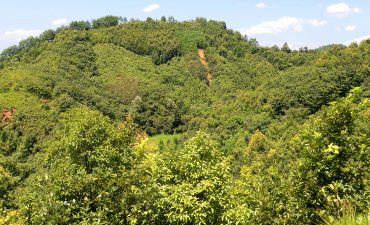Voluminous trees have particularly importance for climate protection
An international study, in which more than 90 scientists participated and in which 48 globally distributed, large forest areas were examined, shows that especially trees of large diameter are important for the forest ecosystem and the storage of carbon dioxide from the atmosphere.
The aim of the study „Global importance of large-diameter trees“, led by Utah State University, was to clarify the contribution of thick trees to biomass, stand structure and species richness in forests. The scientists compared 48 forest plots distributed around the world. About 16 of these forest plots are located in temperate zones and about six in boreal forests, the remaining 26 are distributed among tropical forests. Most of them are primary forests or old secondary forests. In total, more than 5.6 million stems were included in the study.
Bulky trees have great potential in climate protection
On average in the forest areas investigated, 1% of the strongest trees accounted for 50% of the above-ground living biomass. There were significant variations depending on the forest ecosystem. In the Nordic forests the average was 23 %, in temperate forests 38 %. In contrast, a Central European forest in Zofin, Czech Republic, achieved 56% of the biomass with trees with the highest volume.
The authors found further correlations that show how complex the relationships between biodiversity, forest density and biomass are. From their investigations they conclude that forests without large trees cannot bind large amounts of carbon above ground, regardless of species richness or density of large diameter trees. Therefore, the conservation of large-diameter trees in tropical and temperate forests is essential to maintain the full functioning of ecosystems.
Comment
The results of the study show that trees of large dimensions, i.e. particularly old trees, play an important role for forest ecosystems. Protecting stands of large-diameter trees now and allowing forests to reach such dimensions in the future is a solid way to ensure efficient and long-term carbon storage. Forest management that is specifically geared to the removal of individual trees with high diameters can thus make a very good contribution to climate protection. This presupposes high stocks in near-natural forests in which a sufficiently large number of old, thick trees prevail. By increasing the stock, voluminous trees mature in the stands on the one hand and on the other hand, high-quality, long-living products are manufactured from these later. Such a forest management concept, in accordance with the UN recommendations, represents a natural and, as demanded by the Intergovernmental Panel on Climate Change, a low-risk solution for long-term carbon sequestration.
Source
Global importance of large-diameter trees: James A. Lutz et al.; Global Ecology and Biogeography, 2018; 27:849–864, DOI: 10.1111/geb.12747


